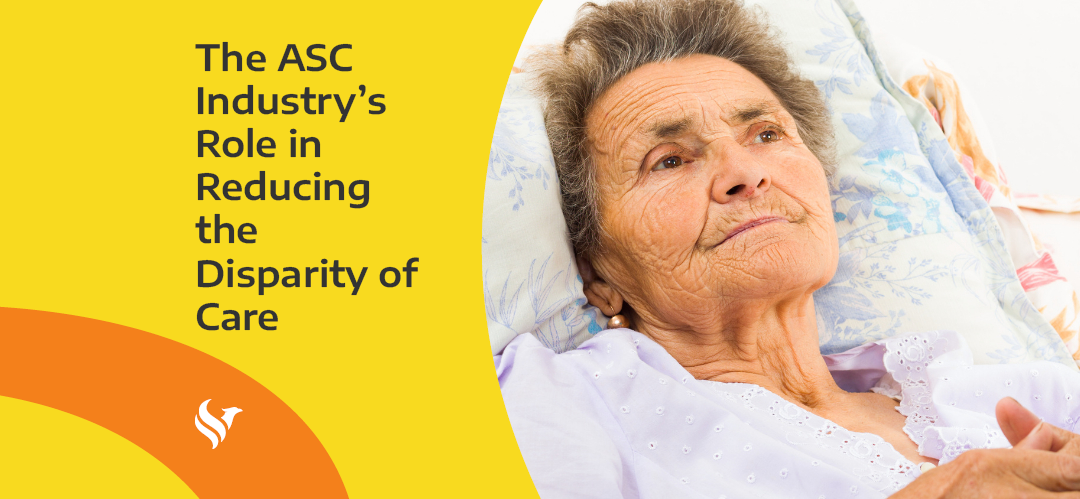Vice President of Clinical Strategies
What We Know
The disparity of care is a big topic in health care today, so it’s time to address how the Ambulatory Surgery Center industry can assist in lessening this issue. It’s important to ask ourselves – are we contributing to or worsening the chasm of care?
According to the Center for Disease Control (CDC), the social determinants of health (SDOH) are conditions in the places where people live, learn, work, and play that affect a wide range of health and quality-of life-risks and outcomes. Social determinants of health include aspects of the social environment such as discrimination, income, education level, marital status, and physical environments such as residence, crowding conditions, isolation, and transportation systems.
Examples of social determinants include:
- the availability of resources to meet daily needs, such as education, job opportunities, living wages, or healthful foods, and
- social norms and attitudes like discrimination, exposure to crime, violence, and social unrest can also be determinants.
Research shows that social determinants can be more important than health care or lifestyle choices in influencing health. For example, numerous studies suggest that SDOH accounts for 30-55% of health outcomes. Addressing SDOH is central to improving health and reducing inequities in care. All industries and civil society should participate, but ASCs do not seem to be front and center of this battle.
How Can ASCs Help?
Most of us want to act, and recognizing the patients at risk is the first step. Income is perhaps the most apparent social determinant of health. Income level shapes overall living conditions, affects psychological functioning, and influences health-related behaviors such as quality of diet, the extent of physical activity, smoking, and excessive alcohol use. ASCs are for-profit and usually provide “elective” surgery. However, many surgeries are necessary to obtain the quality of life we all desire and deserve. Are you taking the time to identify those patients who need monetary assistance? If your center provides its fair share of charity work, that’s a significant first step, but the SDOH identification does not stop at income.
Assessments help nurses objectively identify each patient’s unique needs and concerns and any potential barriers to care that may affect compliance and outcome. Perioperative nurses may encounter the effects of SDOH when patients express concern about:
- Surgery scheduling times
- Transportation
- Child care
- Post-operative assistance
- Other support-related issues during the perioperative period.
Some SDOH may be related to social identity (e.g., race, ethnicity, sexual orientation), resulting in fear of discrimination that some groups experience. Perioperative nurses can establish trust with their patients by identifying their needs and partnering with community-based organizations to address some of those needs (e.g., transportation, legal assistance, prescription medication sources, home health care follow-up). This type of resource assistance may help relieve stress for patients and promote better post-surgical outcomes. Healthcare workers can assist individual patients in addressing the effects of SDOH on their health and life for a particular surgical event. Still, policy and procedure changes are needed to ensure long-term benefits.
Simple Steps That Your ASC Can Start Now:
- Ask the right questions. Here are a few examples to add to your pre-operative questionnaire:
- The patient’s living conditions at home: Is it warm or cool enough? Do you have access to bathing facilities? Do you have resources lined up to check-in and assist if necessary?
- Post-op care: Do you have access to the proper medications, and do you understand what is expected? Are you able to prepare meals for yourself? Do you have access to dressing change materials?
- Have a list of resources at your fingertips, and be prepared to follow up as necessary.
- Provide pre and post-operative instructions to the patient in a format that they can understand and follow. Handing a patient written instructions that they may not be able to read or understand is of no value.
The most significant step we can take is changing the process now. We cannot expect the clinics, offices, hospitals, and providers to be the only ones with their eyes on the potential issues. We all have a role in changing the status quo. The disparity of care is everywhere, and bridging the gap starts with you.
Don’t miss out on the good stuff – Subscribe to HST’s Blog & Podcast!
Every month we’ll email you our newest podcast episodes and articles. No fluff – just helpful content delivered right to your inbox.

